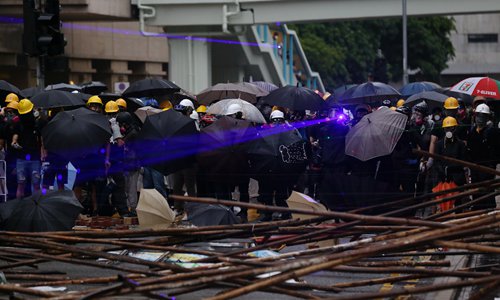HOME >> OPINION
Anti-mask law imperative for Hong Kong
By Zhi Zhenfeng Source:Global Times Published: 2019/9/12 10:51:58

Protesters block roads and aim laser beams to provoke police officers during a protest on Sunday in Tsuen Wan, Hong Kong. Photo: Cui Meng/GT
In movies, masked people cloaked in black are almost always bandits who kill and plunder. Such image is also typical of a member of the Islamic State. However, in the riots that started after the anti-extradition bill protests morphed into a so-called "pro-democracy movement" during the last three months, the belligerent protesters acted violently under the garb of masks and black clothes.
Black clothes and masks give these cowards the guts to do evil. They vandalize the airport, the MTR and governmental buildings, damage Hong Kong's Legislative Council and hurl Molotov cocktails at the police. Such acts go far beyond normal demonstrations. Their acts have already become violent crimes no matter in which country or under which judiciary system. Hong Kong's social order has been sabotaged, its rule of law trodden upon and its economy hard to be revived. More and more Hong Kong residents appeal for laws that ban protesters from masking, so as to prevent the situation from escalating. However, the appeal was strongly opposed by some opposition forces, which also reflects that such a law, if enacted, would be effective.
A black bloc, a tactic used by groups of protesters who wear black clothing and masks, provides a sense of organization, ceremony and security to the protesters. Besides, it makes these protesters feel that they may escape from punishment by luck. From foreign countries' practices, almost all masked protests are accompanied by violence. Consequently, banning masked demonstrations has already become a common law practice, especially in countries including the UK and the US, which Hong Kong opposition has been worshipping.
The British Parliament passed the Waltham Black Act in 1723 in response to raids by two groups of poachers, who used to blacken their faces when carrying out poaching raids against landowners. The act was repealed in 1823. However, amid the anti-austerity movement in the UK in 2011, one of the temporary policies to cope with the protests was to ban the covering of the face during the demonstrations.
It has been found that masked protesters tend to be more liable to commit violent crimes. In the Occupy Wall Street protest in 2011, US police arrested mask-wearing protesters, according to the law stemming back to 1845 which bans masked gatherings.
The Wall Street Journal reported in July that there are 15 US states that have banned masks at protests and rallies and states such as Portland are considering making it illegal for demonstrators to wear masks in an attempt to address violent clashes. So far, there have been 18 countries enacting anti-mask laws, which shows it has become normal for the US and European countries to forbid and punish masked demonstrations by law.
Among these countries, penalties in Canada seem to be the most stringent. The Canadian Parliament introduced Bill C-309, prohibiting the wearing of masks during a riot or other unlawful assembly. Those convicted of it would face a maximum 10-year sentence. France, suffering from the yellow vest movement, also "signed into law legislation giving security forces greater powers at demonstrations," AFP reported on April this year. It would give the power to the authorities to ban protests anyone "posing a particularly serious threat to public order." It also approved making it a criminal offense to cover the face at a protest, punishing one-year sentence and 15,000 euros ($17,000).
Hongkongers have freedom of assembly and demonstration according to the Bask Law of the Hong Kong Special Administrative Region (SAR). People's participating in assemblies and protests is permitted, as long as in a peaceful way and in line with "one country, two systems" principle. The masked ones tend to be unconfident or even harbor sinister designs. Masks have become their shields from the truth.
Since the 2016 Mong Kok unrest, some civic groups in Hong Kong have called for an anti-mask law. Under the situation, although the ban on masked demonstrations is not expected to address all issues, the prompt introduction of such laws would be an effective measure to curb further escalation of violence.
The author is research fellow of Institute of Law, Chinese Academy of Social Sciences. opinion@globaltimes.com.cn
Posted in: VIEWPOINT